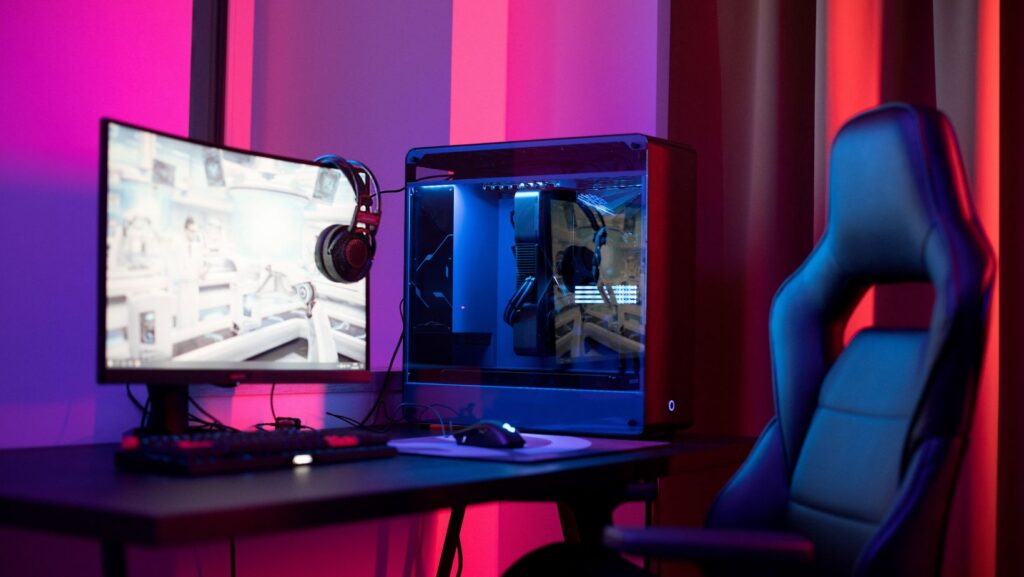Games have captivated us for millennia, offering escape, competition, and pure joy. But what if their potential goes far beyond entertainment? We’re on the cusp of a revolution. Games are becoming powerful allies in our pursuit of health and well-being. Buckle up because the future of healthcare might be fun.
The Biofeedback Bonanza: Transforming Exercise into Play
Imagine a game where your character’s strength mirrors your real-life muscle activity. This isn’t science fiction. Biofeedback games use sensors to translate your body’s signals into in-game actions. Consider a racing game where pedaling your stationary bike propels your virtual car. Or a rhythm game where your heart rate dictates the music’s tempo. Biofeedback games gamify fitness, turning exercise into an engaging and personalized experience.
This isn’t about physical exertion. Biofeedback can also be used for stress management. It is a calming underwater world. Your character’s serenity reflects your decreasing heart rate through calm breathing exercises. Biofeedback games could become a powerful tool for managing anxiety and promoting relaxation.
But biofeedback technology isn’t a one-size-fits-all solution. Consider an individual recovering from a knee injury. While a cycling game might not be suitable, biofeedback could be applied to a chair-based exercise game. This ensures they can still take part and receive feedback on their movements.
The AI-Powered Coach: Personalized Training for Body and Mind
Games offer a set difficulty. But what if they could adapt to your needs? Enter the world of AI-powered coaching within games. AI can power new fitness games. These games can tailor workout routines based on your performance data. It can also guide you through your personal fitness goals. It pushes you further without overexertion, ensuring a safe and effective workout.
This personalized approach isn’t limited to physical fitness. Cognitive training games can integrate AI to identify your mental strengths and weaknesses. The game then designs challenges to maximize brainpower gains. Here is how it works. It improves the areas where you are weak. It also reinforces existing strengths.
The potential of AI coaching extends to mental health as well. Think of a game that acts as a virtual therapist. It can offer personalized guidance and support through interactive scenarios. This could help users navigate social situations. They can also practice assertiveness skills or develop coping mechanisms for anxiety. The AI coach could analyze user responses and tailor its approach. This V-COACH can encourage alternative perspectives or relaxation techniques as needed.
The Sandbox of Self-Discovery: Exploring Limits and Potential
Games offer unique sandboxes to explore ourselves. Open-world virtual environments can become safe spaces for experimentation. This virtual space also allows individuals to practice skills in a controlled setting. It even helps those struggling with social anxiety. The game could create realistic social interactions where they can improve their communication skills. Another perk? They can interact without facing the fears associated with real-world interactions. Are you nervous about a presentation? Use a virtual conference room to rehearse and receive feedback from an AI coach on your delivery and body language.

This self-discovery extends to physical limitations, too. Imagine a virtual reality world where someone with physical restrictions can experience the freedom of movement through their avatar. This could be beneficial for physical therapy. It can allow patients to practice movements in a safe, controlled environment. Furthermore, it can motivate them by showcasing possibilities beyond their current limitations.
However, it’s important to consider ethical implications. These virtual environments should be designed with accessibility in mind, ensuring users with various physical limitations can enjoy the experience.
The Community of Care: Fostering Connection and Support
Games have always fostered a sense of community. Now, imagine online games designed to connect people facing similar health challenges. These could be fitness groups that compete in virtual marathons. Members form bonds through shared goals and achievements. Or consider support groups for chronic illnesses. Members share experiences and motivate each other through in-game challenges.
This online support network can be precious for those battling mental health issues. It is like a game where players embark on a collaborative journey. They overcome obstacles, and it promotes a sense of belonging. This could provide a safe space for individuals to connect, share experiences, and receive emotional support. They also find it easier to find support from peers who understand their struggles.
The Ethical Playground: Balancing Play with Responsibility
Of course, with this exciting potential comes responsibility. Data privacy is paramount. Games that collect health data need robust measures to protect user information. Additionally, ensuring accessibility is crucial. Only some people have access to expensive gaming hardware. Here, mobile games have immense potential. They offer a low-cost entry point into this new world of healthcare. Mobile games can be designed with similar biofeedback and AI coaching features. These personalized healthcare experiences are the future.
The Digital Detox: Encouraging Healthy Screen Time Habits
Games can help us manage screen time better. Digital detox games reward you for taking breaks. For example, you earn in-game rewards if you spend time outside or read a book. This makes it fun to step away from screens. These games also teach why reducing screen time is essential, like preventing eye strain and improving sleep. Turning the screen breaks into a game encourages a healthier balance. This way, gaming remains a fun and healthy part of our lives.
The Education Revolution: Learning Through Play
Games can make learning fun and interactive. Imagine exploring the human body in a game to learn about anatomy. Or time-traveling in a match to understand history. These games adapt to different learning styles, making tough subjects more straightforward.

They also give instant feedback, helping students learn better. With games, learning can be more engaging and effective. This makes education not only informative but also enjoyable and motivating. You will find out at Bizzo casino Study for Canadians that there are casino games that aid memory.
The Eco-Challenge: Promoting Environmental Awareness
Games can teach us about the environment and how to protect it. Imagine playing a game where you solve problems like pollution and deforestation. These eco-challenge games show the impact of our actions on the planet. They also encourage real-world actions, like participating in clean-up events. Players can connect with others who care about the environment, fostering a sense of community. By making sustainability a game, it inspires real-life change and awareness.
Conclusion
Games have been a source of joy and competition for many years. But what if they could do more than entertain? We are now entering a time when games can help us with our health. This new approach makes health care fun and engaging. Imagine exercising or managing stress with the help of a game and or learning new skills and overcoming challenges in a virtual world. Games can connect people, promote healthy habits, and teach us about the environment. The future of health care might be more exciting and interactive than we ever imagined.


